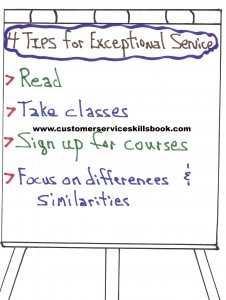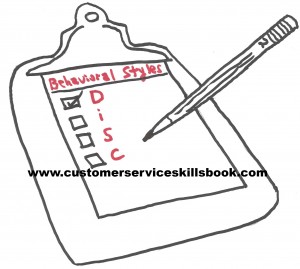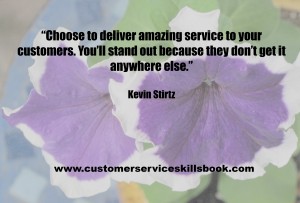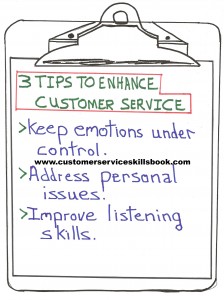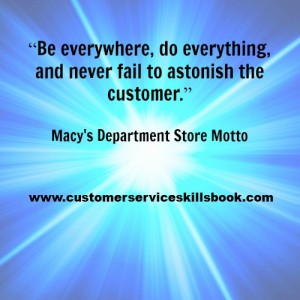Four Tips for Delivering Exceptional Customer Service
Each customer is unique, yet similar. The challenge is to identify their specific needs, wants and expectations and they work hard to meet and exceed those.
The following tips can help you provide better service to all your customers:
- To aid you in your quest for providing the best possible customer service, read whatever positive information you can get your hands on related to customer service.
- Take classes on how to interact and communicate with a variety of different categories of diverse people (e.g. older/younger, differing genders, culturally diverse, and differently-abled).
- Sign up for courses in psychology, sociology, and interpersonal communication. These are invaluable for providing a basis of understanding why people act as they do and how to more effectively interact with them in various environments.
- During your studies, focus on issues of differences and similarities between men and women, cultural diversity, behavioral styles, and any other topic that will expand and round out your knowledge of people.
By going out of your way to enhance your customer service knowledge and skills and improve customer service, you can effectively impact brand and customer loyalty for your organization.
For more ideas on how to create a customer-centric environment where customers enjoy coming to visit you and the organization, read Customer Service Skills for Success and Please Every Customer: Delivering Stellar Customer Service Across Cultures.
About Robert C. Lucas
Bob Lucas has been a trainer, presenter, customer service expert, and adult educator for over four decades. He has written hundreds of articles on training, writing, self-publishing, and workplace learning skills and issues. He is also an award-winning author who has written thirty-seven books on topics such as, writing, relationships, customer service, brain-based learning, and creative training strategies, interpersonal communication, diversity, and supervisory skills. Additionally, he has contributed articles, chapters, and activities to eighteen compilation books. Bob retired from the U.S. Marine Corps in 1991 after twenty-two years of active and reserve service.
Make Money Writing Books: Proven Profit Making Strategies for Authors by Robert W. Lucas at Amazon.com.
The key to successfully making money as an author and/or self-publisher is to brand yourself and your company and to make yourself and your book(s) a household name. Part of this is face-to-face interaction with people at trade shows, library events, book readings, book store signings, blogging or guest blogging on a topic related to their book(s). Another strategy involves writing articles and other materials that show up online and are found when people search for a given topic related to a topic about which the author has written.
If you need help building an author platform, branding yourself and your book(s) or generating recognition for what you do, Make Money Writing Books will help. Bob’s popular book addresses a multitude of ideas and strategies that you can use to help sell more books and create residual and passive income streams. The tips outlined in the book are focused to help authors but apply to virtually any professional trying to increase personal and product recognition and visibility.

